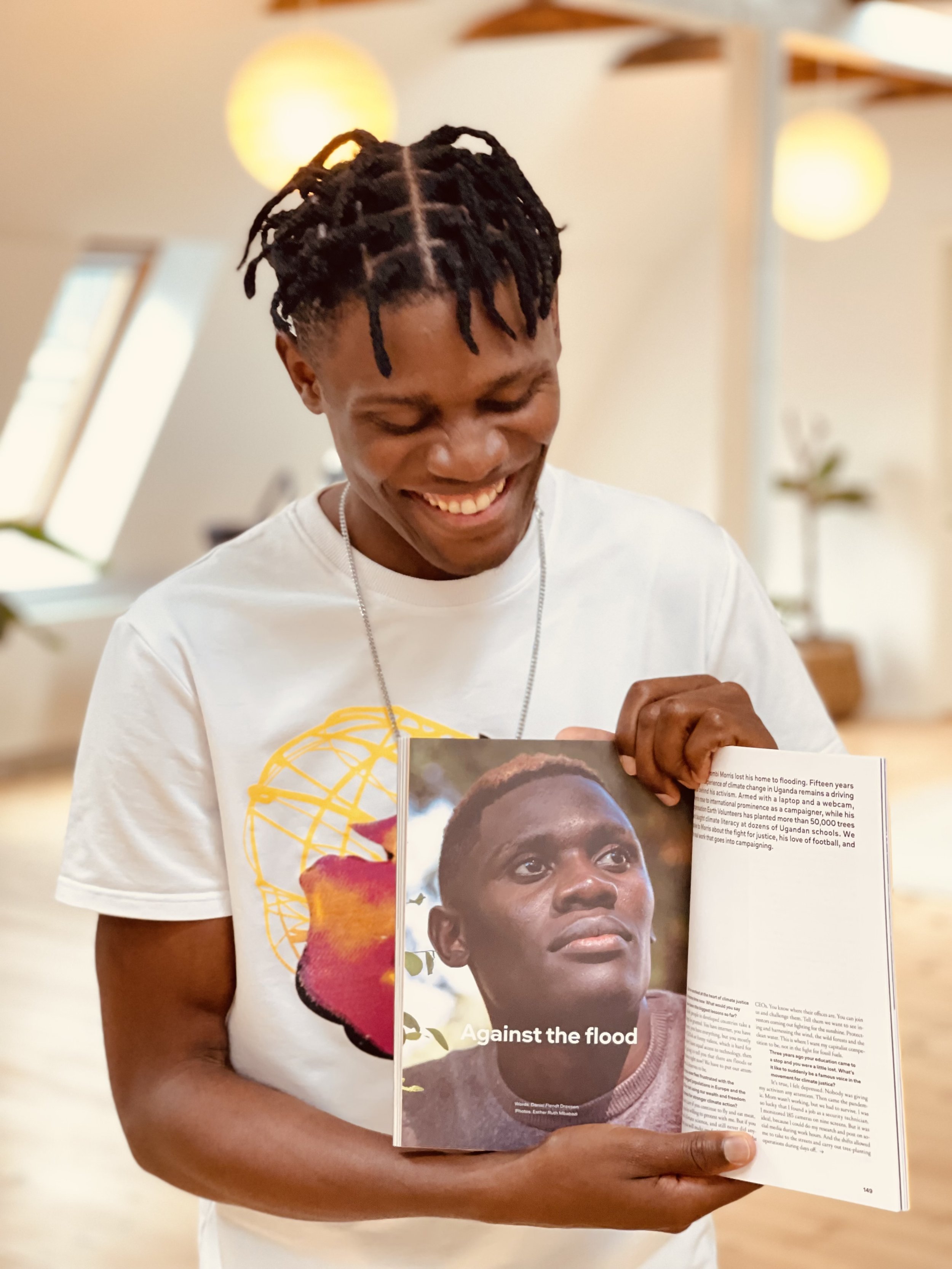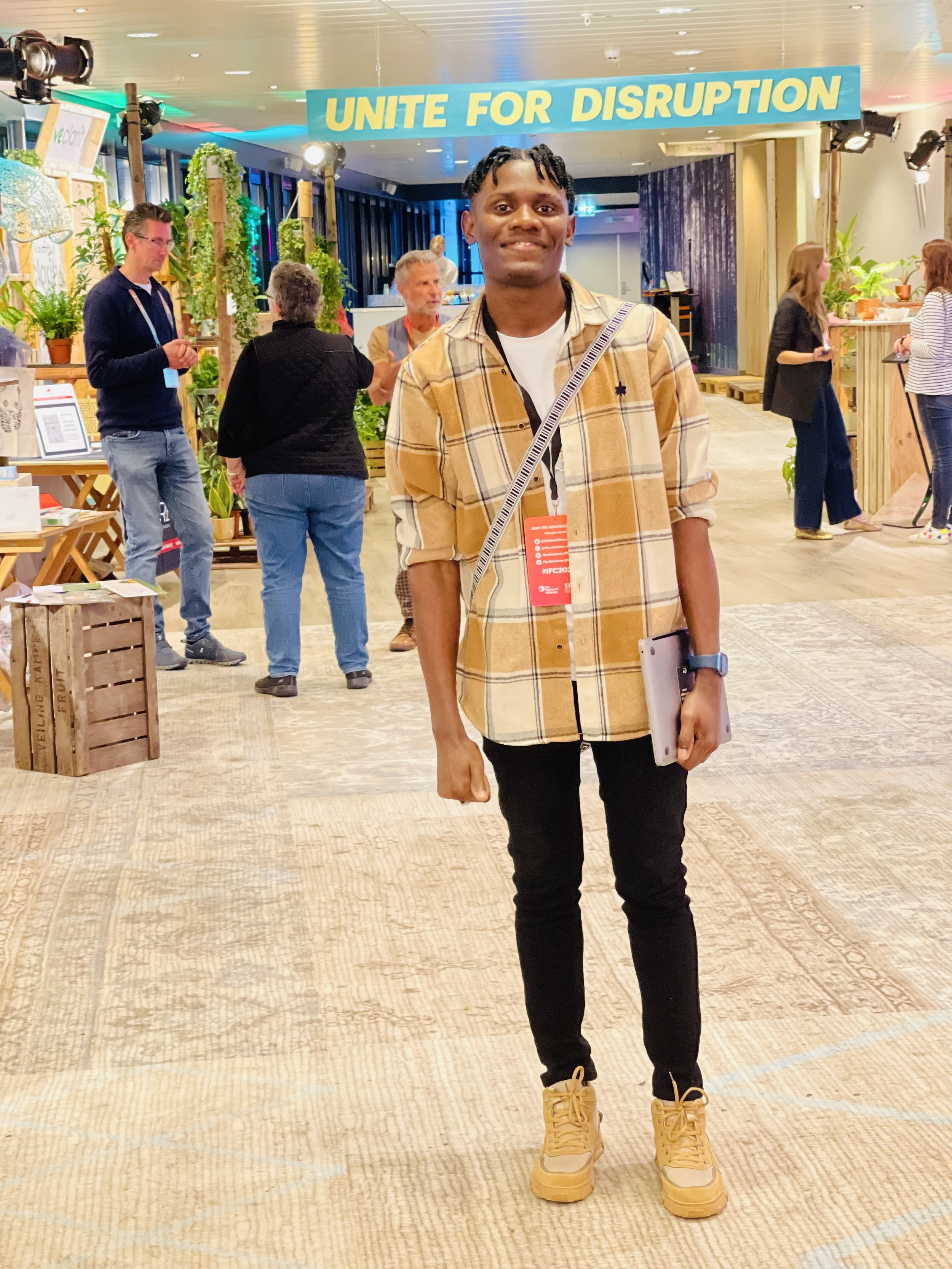INTERVIEW #160 NYOMBI MORRIS
Hi Nyombi! Welcome to A Sustainable Closet! Can you please tell us more about yourself, what do you mostly do during the day?
I describe myself as a committed climate activist and changemaker because I want to see a better future for everyone, not just those in high positions. During the day, I am constantly studying and researching those topics that are kept away from legacy media, which has been critical in my mission to educate the globe about climate change.
Can you tell us more about the moment you started to get engaged in the climate crisis?
It was 2019 when the call came, and I recall my first climate action activity being a community clean up; we were five individuals, very fresh in the system, and when I got home, I was surprised that I had managed to join the street clean up for the first time, given how frightened I was. As time passed, I began conducting extensive studies on climate change and began following anyone I came across on social media who was involved in climate advocacy.
This gave me the confidence to start posting on social media and guess what, people started following me. In October of that same year 2019, I asked my 4-year-old sister Kimberlyn to join me on the street, and I remember being scared of even raising that placard, but when I posted about our strike, people liked it, and I got a lot of following, including a follow from Greta Thunberg, which boosted my confidence, and I started raising the placard whenever we could go on the street, As the following continue to grow, criticism multiplied People wanted to see me doing something on the ground, which made me reconsider, and that's how I devised a strategy of engaging in tree planting initiatives and educating young people about climate change.
What does climate activism mean to you and how can people based on their reality join the climate movement?
To me, climate activism means equality, peace, and justice. Almost everything that happens around the world is interconnected; for example, today the world is ruled by capitalism, whose mission is money; they have exploited people's land to find minerals; they make everything competitive by creating scarcity, which results in conflicts, hunger, poverty, and migration.
This is why everyone must participate in this struggle; for example, it is not true that we must buy food; we have the opportunity to consume free food right from our garden, but why is this impossible, and who is abusing our land? Today, the most pressing issues confronting humanity are migration and sickness, however as you may have read on the internet, experts have conducted extensive studies demonstrating that the primary cause of zoonotic diseases we see today is humanity's interaction with the environment. Today, Africa has the biggest number of people at risk of migration due to climatic catastrophes and wars, all liked to exploitation as we all know that Africa is the most gifted continent but at the same time most vulnerable to almost everything from climate crisis to civil war, hunger, and poverty, its humans who are to blame.
If you have a different belief, I am not asking you to join the climate movement; all I am asking is that you do more research about how this situation came about and what the future will look like if you do nothing; it is through this that I was able to join; the more I did it, the more I cared; today, I am leading the change, and I am confident that with me and my team, the future will not be doomed.
You have founded the organization Earth Volunteers can you please tell us more about the organization's work?
Earth Volunteers is a non-profit organization I founded in 2020 to bring together young people interested in doing climate action on the ground, particularly through community volunteering. We volunteer, but we also have our own initiatives that we have been working on.
We began with ecosystem restoration and tree planting, and we were able to plant over 52500 trees across 18 Uganda forest reserves. In 2021, CNN and Earth.org recognized us.
Climate School 2030 is our second project. We started this in 2020 and have now done climate change awareness in over 23 schools around the country. We have a mission to reach at least 1.5 million Ugandan youth by 2030. Our goal is to see them take the first step before dropping out of school because we don't know what will happen after 2030 because the climate crisis continues to threaten our future and climate education is lacking in schools. We collaborated on this project with large organizations such as UNICEF.
Earth's ECO Village is the name of our 2024 project, which will run until 2030. Previously, we carried out various activities across the country, but we were occasionally denied access to them, so we decided to purchase a plot of land that will serve as an agroecology and climate justice education facility. This will be for mostly women who have been impacted by the climate crisis and want to do something for survival, such as small farming businesses, and students will use this as a study area we will be inviting schools to learn and take action firsthand, this project is large the set up could run until 2026 if money comes in on time
You recently joined a call by the President of Ukraine, how was that experience and how do you see the interlinkages between peace and war and the climate crises?
It was a beautiful experience; when I received an invitation via email, I couldn't believe it was genuine until the event took place. Peace is more than just words; it represents independence and surviving in the way you desire, not the way others want you to survive.
The reason for our call with the Ukrainian President was about the Nova Kakhovka dam that Ukraine claimed to have been attacked by the Russian military, which resulted in hundreds of people migrating because of heavy floods. I believe that climate justice cannot exist without respect for humanity. Whoever bombs your water source, whoever fuels migration by causing an ecological crisis in someone's country, is an enemy of peace because this leads to poverty and unnecessary food insecurity because the things that were destroyed included people's homes and crops. There can't be climate justice if injustices continue to occur on food and people's homes.
Do you feel that your activism leads somewhere? Are leaders listening? Or how can we all stay motivated and hopeful despite the tremendous challenges?
At some point, I believe it is leading to some bombastic moves, but progress is still gradual because the world's attention is still focused on entertainment rather than the issue that is important to them.
Leaders are listening but respond slowly, which is why some young people are going on hunger strikes. The best way to stay motivated is to pay attention to every step you take if you get positive feedback please make sure you celebrate that always and forever as you wait for more to come, that's what I do. I am always thrilled when I visit schools and explain our idea of climate education to students, and when they buy it, it motivates me to do more and reach out to as many children as possible.
What is your view on the fashion industry and what is your take on making fashion (or cloth production) more sustainable?
Apart from fossil fuel oil fields and plastics companies, the fashion industry is one of the top ten polluting industries in Africa today. Today, all used clothes are sent to Africa as a way of creating employment opportunities, but once these clothes are purchased, they are not recycled due to a lack of structures and industries, and all of these end up in landfills.
Now like in my country in Uganda, a country with the second youngest population in the world, young people are also jumping on fast fashion clothes that do not last long when a new one is discovered, it is becoming increasingly difficult for us to protect our landfills because you have the right to throw away everything you don't want.
If we are to remain sustainable in the coming years, we do not need to produce more clothes; we simply need to recycle what is available until they perish; we need more new fashing recycling industries where people can return all the old clothes to be recycled instead of sending them to other continents like the way the west does; today African continent is turning into a pollution collection point; this must change for our survival, particularly in terms of environmental protection.
What is your personal relationship with clothes and how do you prefer to dress?
Haha, I don’t even know what to say, I prefer to wear what makes me comfortable, I always mix colors and designs, I've gone around 12 years without wearing a suit and am looking forward to wearing it someday if I win an award.
Anything else you would like to share with our readers?
The climate movement still needs more people, and we hope to see you join us. It won't be easy, but imagine yourself in 2070, sitting down with your grandchildren, telling them stories of what you did to make the world a better place, Don’t you think it will be worth it if they follow your footsteps? Let's just leave it at that.






